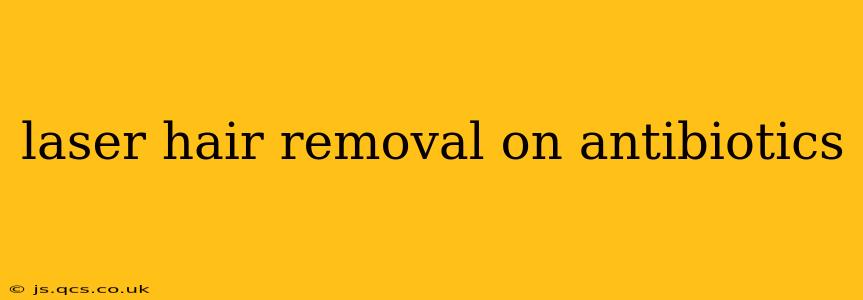Laser hair removal is a popular cosmetic procedure offering long-term hair reduction. However, many factors can influence its effectiveness and safety, including the use of antibiotics. This comprehensive guide explores the relationship between laser hair removal and antibiotics, addressing common concerns and providing insightful information.
Can You Get Laser Hair Removal While on Antibiotics?
This is a frequently asked question, and the answer is nuanced. Generally, it's not recommended to undergo laser hair removal while on antibiotics. However, the specific impact depends heavily on the type of antibiotic and the reason for its use. Some antibiotics can increase photosensitivity, making your skin more susceptible to sun damage and potentially increasing the risk of complications from laser treatment.
What Antibiotics Increase Photosensitivity?
Several antibiotics are known to increase photosensitivity. These include, but aren't limited to, tetracyclines (like doxycycline and minocycline), fluoroquinolones (like ciprofloxacin and levofloxacin), and sulfa drugs (like sulfamethoxazole). It's crucial to check the information leaflet provided with your medication or consult your doctor or pharmacist about the potential for photosensitivity. They can advise you on the best course of action regarding laser hair removal.
What Happens if You Get Laser Hair Removal While on Photosensitizing Antibiotics?
Undergoing laser hair removal while on photosensitizing antibiotics can lead to increased risks, such as:
- Burns: Your skin's heightened sensitivity to light can make it more vulnerable to burns during the laser treatment.
- Hyperpigmentation: This means darker skin patches can develop in the treated area, which might be harder to treat and potentially permanent.
- Hypopigmentation: This is the opposite – lighter patches appearing on the skin.
- Delayed Healing: Your skin's ability to heal may be compromised, prolonging recovery time.
Does the Type of Laser Matter?
The type of laser used in hair removal can influence the outcome when combined with antibiotics. Different lasers operate at different wavelengths and have varying levels of energy intensity. It's important to discuss this with your laser technician to determine the safest approach, considering your antibiotic medication.
Should You Wait Until You Finish Your Course of Antibiotics?
Yes, it's generally advisable to wait until you've completed your course of antibiotics before scheduling laser hair removal. This allows your skin to return to its normal state of photosensitivity, minimizing the risks associated with the procedure. The length of time you need to wait depends on the type and dosage of antibiotic, so consulting your doctor or dermatologist is essential.
What Should You Do If You're Already on Antibiotics and Need Laser Hair Removal?
If you're already on antibiotics and require laser hair removal for a pressing reason, consult both your doctor and the laser technician. They can work together to assess the risks, evaluate your specific situation, and determine the best course of action. This may involve delaying the treatment, adjusting the laser settings, or exploring alternative options.
What About Other Medications?
It's not just antibiotics that can impact laser hair removal. Other medications, such as retinoids and certain acne treatments, can also affect your skin's sensitivity and healing process. Always disclose all medications you're taking to your laser technician before proceeding with the treatment. This comprehensive information ensures a safer and more effective procedure.
This information is for general knowledge and doesn't constitute medical advice. Always consult with your doctor or a qualified dermatologist before making any decisions about your medical treatment or cosmetic procedures.
